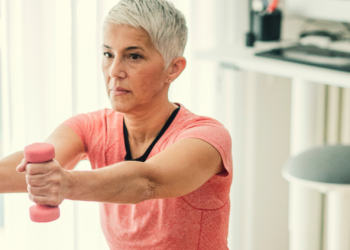Articles By Pillar
Read the latest blog posts from lifestyle medicine experts at Stanford University covering health topics across our 7 pillars.
Top 6 Supplements for Women 40+
By Maya Shetty, BS and Felicia Song, BS Midlife marks a significant life transition, bringing hormonal shifts that can reshape a woman’s body and well-being. As women navigate this period, their bodies undergo physiological changes that can impact muscle mass, bone density, metabolism, and overall well-being. Lifestyle factors play a fundamental role in healthy aging, but strategic supplementation can further support women in optimizing their health through midlife and beyond. Nutrition and exercise researcher at Stanford Lifestyle Medicine Rachele Pojednic,...
Everything You Need to Know About Pelvic Floor Health
By Sharon Brock, MS, MEd For most women, discussions about the pelvic floor are typically tinged with embarrassment. When our pelvic floor muscles (which form a hammock-shaped barrier across the base of the pelvis) are compromised, we can experience a variety of taboo-laden symptoms such as incontinence, constipation, and painful sex. Even though pelvic floor disorders affect twenty percent of women in the U.S. (and more than half of women over 80), many suffer in silence because they are too...
Strength Training for Women 50+
By Yasaman Nourkhalaj, BS and Sharon Brock, MS, MEd If you're in your 50s, you might have noticed that simple tasks like getting up from the floor or cleaning the bathroom aren't as easy as they used to be. For decades, women have been bombarded with messages about getting thinner. But around the age of 50, the focus should shift from losing weight to gaining strength. Building muscle isn't just about looking strong – it’s about living strong and extending...
Finding Purpose in Midlife and Beyond
By Sharon Brock, MS, MEd “What is it you plan to do with your wild and precious life?” What if this famous line by poet Mary Oliver was not only relevant to people in their teens, but also in midlife? Given the considerable research on longevity, people are living healthier and longer lives, redefining what it is to be middle-aged. There is an antiquated cultural belief that once a person reaches the age of about 50, it’s too late to...
How Mindfulness Can Soothe Tension at Family Gatherings
By Angel Cleare, BS As we prepare our holiday meals, we may reflect on how this family gathering unfolded last year. It may have started well, with many smiles and joyful conversations of family members sharing what was happening in their lives. But, when everyone sat down at the dinner table, one family member couldn’t stop complaining about the food, and another couldn’t resist voicing their antagonizing opinions. Knowing this may happen again, we may ask ourselves, “What can...





